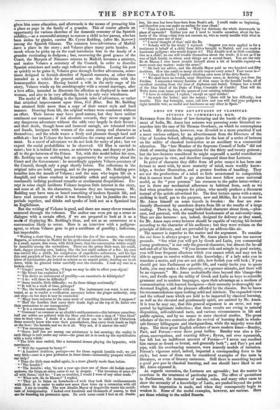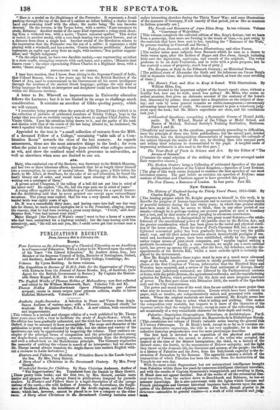AMOS ON THE ADVANTAGES OF CLASSICAL STUDIES TO COMMERCIAL MEN.
RETIRED from the labour of law-lecturing and the bustle of the govern- ment of India, Mr. Amos last autumn was pursuing some historical re- searches into the case of Sir Thomas Overbury, on which he contemplates a book. His attention, however, was diverted to a more practical if not a more curious subject, by an advertisement from the Directors of the City of London School, offering prizes for the beat of a series of lectures on the utility of classical instruction as an auxiliary to a commercial education. The "late Member of the Supreme Council of India" did not think of entering into the competition for the thirty and twenty guineas; but the law-lecturer considered he might superadd a useful contribution to the purpose in view, and therefore composed these four Lectures.
In point of character they differ from all prize essays it has been our fortune to meet with, by more maturity of mind, more worldly know- ledge, a fresher illustration, and a greater freedom of handling. They are not the productions of a mind so little accustomed to composition that it cannot trust itself to go alone but must follow some universal model, as the "poor penman" has recourse to the polite letter-writer ; nor is there any mechanical adherence to habitual form, such as we find when preachers compete for prizes, who mostly produce a discourse instead of the article advertised for. The first lecture opens with a story, striking in itself; pat to the purpose, new and lifelike, for it occurred to Mr. Amos himself on some travels in Sweden: the four are con- tinually illustrated by anecdotes drawn from life or the results of a large reading. There is, too, a strong individual character about them,—plea- Bent, and paternal, with the unaffected bonhommie of an university-man. They are also lectures : not, indeed, designed for delivery as they stand, for Mr. Amos says every lecturer should be capable of varying his lecture according to the character of his audience ; but they were written 011 the principle of delivery, and are pervaded by an address-like air. The manner is superior to the matter and the argument. To consider the cui bono is always proper but Mr. Amos places it upon too narrow grounds. "See what you will get by Greek and Latin, you commercial young gentlemen," is not only the general character, but almost the be-all and end-all of his theme. "If you become rich and mingle in good society, you will hear frequent allusions which you cannot relish and may not be able to appear to receive without this knowledge ; if a lady asks you to translate a motto, and you are not able, how foolish you will look; if you should get into Parliament or public life, and vanity incite you to quote Latin, you may make a false quantity, or a grosser mistake, and there will be an exposure." Mr. Amos undoubtedly rises beyond this 'change-like view, and dwells upon the utility of Greek and Latin as keys to scientific grammar and to modern languages, upon their advantage as a medium of communication with learned foreigners—their necessity to thoroughly un- derstand English, and the pleasure afforded by the classics. But he bases his recommendations upon nothing solid and intrinsic. The expanded views and the refined taste which are held to be imparted by classical learning, as well as the elevated and gentlemanly spirit, are omitted by Mr. Amos. It is true he may say, that this general argument is an error, not sup- ported by legitimate induction ; that these results are owing to natural disposition, self-cultivated taste, and various circumstances in life and public opinion, and by no means to mere classical studies. The great scholars of the two centuries after the revival of learning dealt in whole- sale literary billingsgate and blackguardism, while the majority were dull dogs. The three great English scholars of more modern times—Bentley, Parr, and Porson—were three great bullies. Bentley was also a liti- gious, unscrupulous, and exacting fellow; Byron, not over squeamish, has left but an indifferent account of Porson--" I never can recollect him except as drank or brutal, and generally both" ; and Parr's pot and pipe, with his overbearing manners, were scarcely models of imitation. Porson's vigorous mind, indeed, imparted a corresponding force to his style; but none of them can be considered examples of fine taste in literature, or even of literary eminence. Still there is something beyond a quid pro quo in classical learning, and one should have liked to see Mr. Amos expound it. As regards execution, the Lectures are agreeable; • but the matter is overdone in the treatment of particular parts. The effect of quotations in Parliament, the instances of medals, coins, and many other cases to show the necessity of a knowledge of Latin, are pushed beyond the point where the impression is made, and when they consequently begin to weaken it. Some of the medal examples, however, are curious. Here are those relating to the exiled Stuarts. "Hem is a medal on the illegitimacy of the Pretender. It represents a Jesuit plashing through the top of the door of a cabinet an infant holding a chalice mono hand and crowning itself with the other; the motto being Sic non hairedes deerunt.' On the reverse, is the Trojan horse, with a motto, Eqno ntinquam tu crede, Britanne.' Another medal of the same kind represents a young stem shoot- ing from a withered tree, with a motto, ' Tamen nascatur oportet' This device Is varied, in another medal, with a rose-bash bearing two decayed flowers, and at a distance from them a single bud. Another medal of the Revolution relates to the imputation that the Pretender was the son of a miller: it represents a child playing with a windmill, and has a motto, Contra infantem perditionis: Another represents an eaglet cast away from an eagle, with mottoes,' on patitur supposi- titles' and Rejicit indignant.' "on the other hand, we have two Jacobite medals,—one representing an infant in a state cradle, strangling serpents with each hand, and a motto, Monstris dant funera mum '; the other representing Prince Charles in a Highland dress, with a motto, Sawa Clap&
DIPLOMATIC ISE OF GREEK.
I may here mention, that I know, from sitting in the Supreme Connell of India, that Colonel Benson, when a few years ago he was the British Resident of the Court of Ava, used to communicate to his Government all his secret intelligence throngh the medium of the ancient Greek language; perhaps the only dead or living language for which an interpreter and decipherer could not have been found within the Burmese territory.
A letter to Dr. Whewell on improvements in University education foflows the Lectures; but it is too limited in its scope to challenge much Consideration. It contains an anecdote of Gibbs quoting poetry, width We will extract.
"I remember being present when the portrait of Sir Edward Coke (which is in the collection of pictures of celebrated members of Trinity College, kept in the Ledge that you now so worthily occupy) was shown to another Chief Justice, Sir Aricary Gibbs. U his attention being drawn to it, and the parity of his rank and station with t t of the oracle of the law being alluded to, he exclaimed, `So were I equalled with him in renown!' " Appended to the text is "a small collection of extracts from the MSS. of a deceased Fellow of a College," containing "table talk of a Com- bination Room" towards the close of the last century. As regards amusement, these are the most attractive things in the book; for even When the point is not very striking the jests exhibit what colleges receive as wit, and show the confined mind which generates in universities, as well as elsewhere when men are limited to one set.
ANA.
• Maty, who conducted one of the Reviews, was Secretary to the British Museum, and had two or three laborious offices, insomuch that he at length threw himself into a consumption, by excess of mental labour. Having gone, a little before his death, to Mr. Alix's, at Swaf ham, for the sake of air and relaxation, he found his beet's library out of order, and would insist upon classing all the books, and writing out a catalogue of them."
A person asked Chapman, if the tolling of a bell did not put him in mind of his latter end? He replied, " No, Sir, but the rope pats me in mind of yours." A young officer applied to the Archbishop of Canterbury for a special licence: but the Archbishop said that he never granted one except upon extraordinary occasions. The young man replied, that his was a very special ease, for his in- tended bride was eighty years of age.
Dr. M. was a remarkably dirty man; and having come into hall one day very late for dinner, he made several apologies for it to the President, alleging, among the reasons, that he had been turning a great many things. "I wish, ' said Anti-
Sujanus "you had turned your shirt."
Major Hanger [the Prince of Wales's crony] went to buy a horse of a person who had been committed for a highway robbery; bat the man having eyed him attentively, said, "He will not suit you, Sir; I could never get him to come near a carriage."



























 Previous page
Previous page